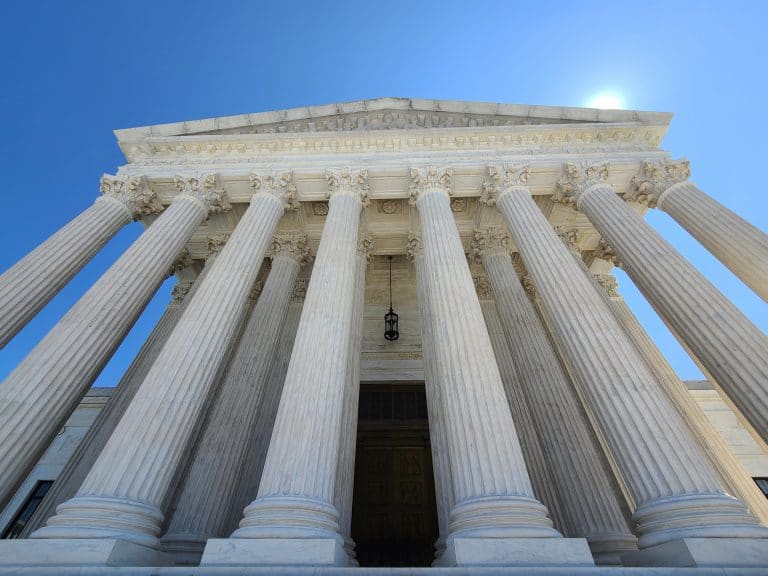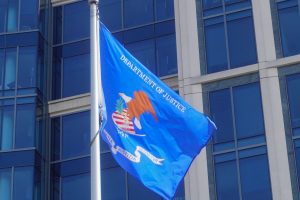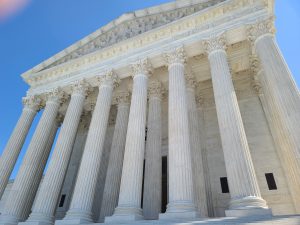Gun-control supporters have made their argument to the High Court on one of the biggest gun cases in a generation.
Political nonprofits, lawyer groups, and government officials filed more than 30 different briefs with the Supreme Court on Tuesday in support of upholding New York’s gun-carry law. The flood of briefs came at the deadline for supporters of the restrictive gun-carry law to submit amicus briefs.
The briefs seek to persuade members of the Supreme Court before oral arguments begin in NYSRPA v. Bruen. The case will decide if New York’s “may-issue” law, which gives officials broad discretion in determining who has “proper cause” to carry a gun in public, violates the Constitution. It will be the first time the Supreme Court has decided whether—or how far—Second Amendment protections extend beyond the home.
The outcome of the case could produce far-reaching consequences for the right to carry a firearm across the country. If the Supreme Court decides to strike down New York’s restrictive law, it could threaten the restrictive gun-carry laws in the seven other states with may-issue permitting. While 42 states and Washington, D.C., have gun-carry laws that remove subjective determinations by officials from the process, the states with laws similar to the one in New York are home to about a quarter of the American populace.
The American Civil Liberties Union (ACLU), American Bar Association (ABA), the NAACP, and the Biden administration were among those who filed amicus briefs in support of legal restrictions on public carry. They argued the restrictions were constitutional and should be upheld. Many of the groups relied on historical arguments to support upholding the law.
“Throughout the Nation’s history, legislatures have adopted regulations to address the distinctive risks posed by the public carrying of concealed or concealable arms,” said Biden officials’ brief filed on behalf of the United States. “New York’s law—which is itself a century old—fits squarely within that long tradition.”
The ABA said history supported the ability of states to regulate the carrying of firearms and that it would threaten public safety if the Court ruled otherwise.
“State and local governments have, over centuries, experimented with diverse approaches to the regulation of concealed carry, and these approaches have evolved over time in response to changes in local conditions and judgments about how best to protect the public’s safety in the public square,” the ABA’s brief said. “In the ABA’s view, it would be disruptive to centuries of settled practice—and deleterious to the protection of human life—to revoke State and local governments’ flexibility to balance these interests in fashioning concealed carry regulation.”
Other briefs made arguments claiming the expansion of public carry would threaten other constitutional rights, including the First Amendment right to free speech.
“This is a case about the Second Amendment, but its resolution also implicates fundamental First Amendment values—the freedoms of assembly, association, and speech,” the ACLU’s brief read. “States have many justifications for regulating the public carrying of weapons, concealed or otherwise. But one especially important justification is that such restrictions facilitate civic engagement, by promoting safety and reducing the chances that the disagreements inevitable in a robust democracy do not lead to lethal violence.”
Briefs filed in support of overturning New York’s restrictive carry law were submitted on or before July 20. Nearly 50 briefs were submitted by notable amici including the National Rifle Association, Second Amendment Foundation, Cato Institute, National African American Gun Association (NAAGA), Black Attorneys of Legal Aid, 25 current U.S. senators, and 176 current members of the U.S. House of Representatives.
These briefs largely focused on the text, history, and tradition of the Second Amendment and the practice of publicly carrying arms, which they said does not support a restrictive law like New York’s.
“The record from every relevant period of American history thus could not be more clear,” the Second Amendment Foundation’s brief said, going on to quote a case from the 19th century. “[W]hile the government may bar people from carrying firearms for unlawful and violent purposes, and may impose regulations on the mode of carrying (open vs. concealed), it may not enforce a law ‘which, under the pretence of regulating, amounts to a destruction of the right, or which requires arms to be so borne as to render them wholly useless for the purpose of defence.’”
NAAGA and other black gun-rights organizations filed briefs claiming that the discretionary nature of may-issue permitting was racist in origin and in its application. NAAGA argued the law was irredeemable and should be struck down.
“New York’s discretionary licensing scheme is within a similar legacy as the Black Codes and Jim Crow regimes that prohibited the carrying of firearms by African Americans without a license subject to the discretion of the licensing authority,” the group said in its brief. “The difference is that, instead of discriminating only against black people, it deprives the people at large of the right to bear arms and bestows the privilege on a tiny subset of ‘the people.’”
The ACLU and NAACP recognized the racist history of laws similar to New York’s may-issue carry law but argued in their briefs that striking down all modern may-issue laws was not the proper solution. The NAACP said what NAAGA wants is too expansive to make a good solution to the racial issues with the law.
“Finally, LDF and the National Urban League acknowledge and take seriously Petitioners’ and their amici’s assertions that New York’s firearms regulations are tainted by racial discrimination in their origins and enforcement,” the NAACP’s brief said. “However, the proper remedy for these arguments, if proved, is not an expansive, ahistorical approach to the Second Amendment that would undermine states’ ability to reasonably regulate gun possession in ways that protect Black communities and other communities of color.”
The group instead suggested that case-by-case challenges under the Fourteenth Amendment were the better remedy for individuals who felt that New York’s handgun laws were racially discriminatory.
The Supreme Court will hear oral arguments in the case on November 3, and a decision is expected by June of next year. The full list of briefs can be found here.







2 Responses
It’s telling how virtually every one of the amici briefs supporting New York play fast and loose with the concept of “regulation.” Of course, what they’re really proposing is outright prohibition—to delete the words “and bear” from the text of the Constitution.
Each brief also argues against a straw man, insisting that any recognition of a Second Amendment right to publicly carry arms will deprive states of the power to enforce any regulations whatsoever.
The Ninth Circuit sitting en banc played the same game in Young v. Hawaii.
It’d be great if the Supreme Court took the text to heart and actually ruled that “right of the people to keep and bear Arms, shall not be infringed.” But all of us—including the State of New York and its amici—know that’s not going to happen.
It certainly would not have happened when the liberal/revisionist and conservative/originalist factions were balanced with the deciding vote going to the “we don’t want to make waves,” “no sweeping changes” Chief Justice. It will be interesting to see if the current court is willing to right decades of bad laws that clearly violate the plain text of the Second Amendment in this case. That the Court took the case is a good sign, in my view.